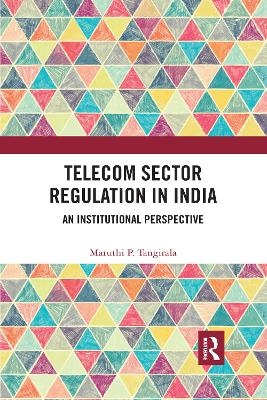
Telecom Sector Regulation in India
Routledge India (Verlag)
978-0-367-73143-4 (ISBN)
- Titel z.Zt. nicht lieferbar
- Versandkostenfrei
- Auch auf Rechnung
- Artikel merken
The telecom revolution was a game changer in post-liberalization India, a country today home to the second largest subscriber base in the world– more people have access to mobile phones than toilets. Its rapid, relentless growth has created new possibilities and challenges, including a robust regulatory policy. This book, the first comprehensive survey of TRAI’s progress, examines the salient developments in regulation of the Indian telecom sector. It analyses, at the macro-institutional level, the norms and rules reconstituted over time; at the institutional level, the impact of important court judgments, relevant telecom case law (including the 2G judgment and Adjusted Gross Revenue-related cases), and the ‘judicialization’ of regulatory governance; and, at the micro-institutional level, the mechanisms of governance of TRAI and the way its functioning has affected the alignment of incentives in the regulatory space. It provides an overview of the regulatory framework and the context in which the telecom sector was deregulated, the structure of internal governance, and issues in telecom licensing and spectrum allotment.
The book combines academic rigour and empirical research with a practitioner’s perspective of the unfolding events. It will interest students and researchers of economics, law, public policy, communications technology, and ICT policy and regulation, as well as telecom sector professionals, service providers, academic experts, policymakers, and think tanks.
Maruthi P. Tangirala is Deputy Director General, Department of Telecommunications, Ministry of Communications, New Delhi, India, and an officer of the Indian P&T Accounts and Finance Service (1990 batch). He holds advanced degrees in Management (Indian Institute of Management, Calcutta), Public Administration (Panjab University/The Indian Institute of Public Administration), and Law and Governance (Jawaharlal Nehru University), in addition to degrees in Civil Engineering (College of Engineering, Guindy) and Law (Osmania University). He has worked in the Government of India’s Department of Telecommunications and in Telecom Regulatory Authority of India, Union Public Service Commission, and Insurance Regulatory and Development Authority of India, as well as in Bharat Sanchar Nigam Limited, in different functional areas. He has published scholarly articles and opinion pieces in the Economic and Political Weekly, Competition and Regulation in Network Industries, and Indian Express, among others.
Part I Overview 1. Introduction Part II Judicialization and the Framework of Regulatory Governance in the Indian Telecom Sector 2. TRAI: Origin and Early Years 3. Tribunalization and After Part III Crafting Order? Two Decades of the Regulatory Institution 4. The First Regulatory Phase 5. Transition to Unified Access 6. The Competitive Second Phase (2004–7) 7. The Third Regulatory Phase Part IV Organization and Micro-Governance of TRAI 8. TRAI’s Institutional Design and Organizational Ethos 9. Penal Powers of TRAI
| Erscheinungsdatum | 16.01.2021 |
|---|---|
| Verlagsort | London |
| Sprache | englisch |
| Maße | 138 x 216 mm |
| Gewicht | 530 g |
| Themenwelt | Naturwissenschaften |
| Sozialwissenschaften ► Kommunikation / Medien ► Journalistik | |
| Sozialwissenschaften ► Politik / Verwaltung | |
| Wirtschaft | |
| ISBN-10 | 0-367-73143-6 / 0367731436 |
| ISBN-13 | 978-0-367-73143-4 / 9780367731434 |
| Zustand | Neuware |
| Informationen gemäß Produktsicherheitsverordnung (GPSR) | |
| Haben Sie eine Frage zum Produkt? |
aus dem Bereich


